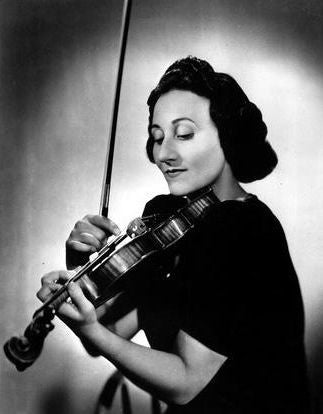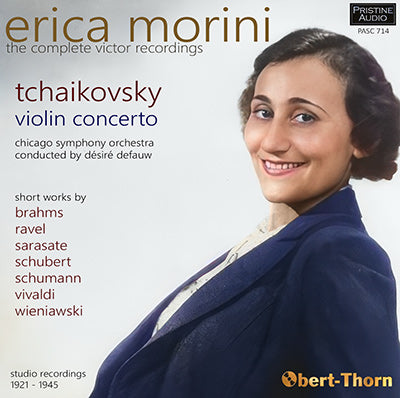Erica Morini

Erika Morini (January 5, 1904 - October 31, 1995) was a Jewish Austrian violinist.
Morini was born in Vienna, and received her first instruction from her father, Oscar Morini (originally spelled Oser or Ojser, family name Moritz), who was the director of his own music school in the Imperial capital Vienna, and completed her studies under Otakar Ševčík. Hers was a case of remarkable precocity.
When she made her début in 1916, with the Leipzig Gewandhaus and the Berlin Philharmonic orchestra, under Arthur Nikisch, the critics made no allowance for her youth, but spoke of her work as the equal of that of the most famous of the younger generation of violinists. Her American début at the age of seventeen in New York (January 26, 1921) was one of the musical sensations of the year, and since then she performed in the United States often, both in recital and with the foremost orchestras. Shortly after her New York début, she was presented with the Guadagnini violin which had been owned by the celebrated American Violinist Maud Powell, who had died in 1920. In March 1921, Morini made her first recordings for the Victor Talking Machine Company in Camden, New Jersey, accompanied on the piano by her sister, Alice. She resided in New York after 1938, and began spelling her first name Erica. She made her first visit to London in 1923.
On the boat ride from Europe to New York, Erica and her cousin Louis played violin and clarinet together for the first class passengers, and were allowed to stay in first class on account of their popularity.
Along with the Guadagnini violin, Morini also played the "Davidov" Stradivarius violin from the year 1727, named for the Russian cellist Karl Davydov. Morini’s father had purchased it for her in Paris in 1924 for $10,000.
Morini retired in 1976 and reportedly never played the violin again.
Morini's valuable Davidov Stradivarius (as well as paintings, letters, and her scores, complete with fingerings and other valuable notes) were stolen from her New York City apartment shortly before her death in October 1995, at the age of 91. She had been hospitalized with heart disease and was never told of the theft. The crime remains unsolved.
Morini is believed to be the last surviving recording artist who made acoustic Red Seal Records for the Victor Talking Machine Company. Four months after her death, Erica Morini was described in the journal The Strad as the “most bewitching woman violinist of this century.”
She was particularly admired for her performances of the concerto repertory, especially the concertos of Ludwig Spohr, which she helped restore to popularity. She also played and recorded the great concertos of Mozart, Beethoven, Mendelssohn, Brahms and Tchaikovsky.
Morini was honored with numerous awards and prizes. she received honorary doctorates from Smith College, Massachusetts, in 1955, and from the New England Conservatory of Music, Boston, in 1963. The City of New York honored her lifetime achievement with a gold medal in 1976. Despite the respect in which she was held, Morini is largely forgotten today.
A stage play about Morini, The Morini Strad, by Willy Holtzman, had its world premiere in 2010.

Erica Morini
Erika Morini (January 5, 1904 - October 31, 1995) was a Jewish Austrian violinist.
Morini was born in Vienna, and received her first instruction from her father, Oscar Morini (originally spelled Oser or Ojser, family name Moritz), who was the director of his own music school in the Imperial capital Vienna, and completed her studies under Otakar Ševčík. Hers was a case of remarkable precocity.
When she made her début in 1916, ...
TCHAIKOVSKY Violin Concerto
BRAHMS Hungarian Dances
VIVALDI Violin Sonata in D
music by Ravel, Sarasate, Schubert, Schumann, Wieniawski, Zarzycki, Godard, Svendsen, Toselli, Tobani, Lange
Studio recordings, 1921-1945
Total duration: 2hr 3:22
Erica Morini, violin
Alice Morini, piano
Emanuel Balaban, piano
Sàndor Vas, piano
Kurt Hetzel, piano
Nathaniel Shilkret, piano
Max Lanner, piano
Artur Balsam, piano
Chicago Symphony Orchestra
conducted by Désiré Defauw
BRAHMS Symphony No. 1 - Symphony No. 2 - Double Concerto - Song of Destiny - Tragic Overture - Hungarian Dance No. 17 - Symphony No. 3 - Symphony No. 4 - Piano Concerto No. 2 - Violin Concerto - Piano Concerto No. 1 - Haydn Variations - Alto Rhapsody - Academic Festival Overture - Un Requiem Tedesco (A German Requiem, sung in Italian)
Recorded 1941-1954
Bruno Walter, conductor
John Corigliano, violin
Leonard Rose, cello
Erica Morini, violin
Myra Hess, piano
Clifford Curzon, piano
Enid Szantho, contralto
Rosanna Carteri, soprano
Boris Christoff, bass
Philharmonic-Symphony Orchestra of New York
Hugo Strelitzer Choir
Hollywood Bowl Symphony Orchestra
Rome Symphony Orchestra & Chorus of RAI
BRAHMS Piano Concerto No. 2 - Violin Concerto
Live recordings, 1951/53
Total duration: 2hr 35:06
Erica Morini, violin
Myra Hess, piano
Philharmonic-Symphony Orchestra of New York



